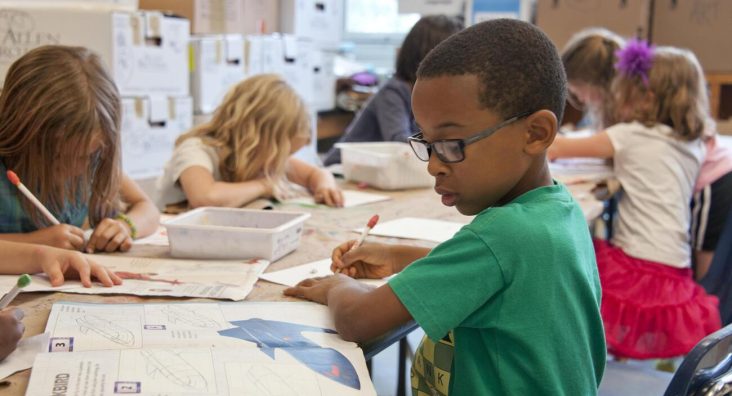Ballot push would make private schools taking LEARNS money meet state standards
by December 21, 2023 4:38 pm 1,296 views

A coalition has submitted a proposed amendment to the Arkansas Constitution that would require private schools receiving state funds to meet public school state standards. It also would obligate the state to fund pre-K, after school and summer programs, provide assistance to lower income children, and fund special education services.
The ballot question committee For AR Kids said in a press conference Dec. 21 that it had submitted the Educational Rights Amendment of 2024 to Attorney General Tim Griffin. It also presented polling results that it said showed strong support for the amendment.
The coalition includes the Arkansas Public Policy Panel, the Arkansas chapter of the NAACP, the Arkansas Education Association, and CAPES. CAPES earlier this year tried unsuccessfully to qualify a referendum for the November 2024 ballot that could have overturned Gov. Sarah Huckabee Sanders’ LEARNS Act.
Griffin must approve the submission before For AR Kids begins collecting the required 90,704 valid signatures to qualify for the November 2024 ballot.
The proposed amendment would require private schools that receive local and state funds to comply with state academic and accreditation standards, including student and school assessments. Failure to do so would result in a loss of state funds.
Examples of state funds include state benefits helping families with the cost of attending a private school. The LEARNS Act created “educational freedom accounts” that, when fully implemented, will make state funds available to all parents to help pay for a private school education.
The proposed amendment further defines local and state funds as “any other source of public funds.”
The amendment also would list as a state obligation four services:
– Universal access to early childhood education from age 3 until a student qualifies for kindergarten
– Universal access to afterschool and summer programs
– Assistance to children within 200% of the federal poverty line to achieve an adequate education and overcome poverty’s negative impact on education
– Supports and services meeting the individual needs of students with disabilities
“These four reforms represent the best opportunity we have to give our students the tools and the resources they need to succeed,” said Bill Kopsky, For AR Kids’ treasurer and the executive director of the Arkansas Public Policy Panel. “The evidence is unbelievably clear that these programs work. In peer-reviewed study after peer-reviewed study, these consistently come out on top as our best investments.”
Sanders’ spokesperson, Alexa Henning, expressed opposition to the proposed amendment in an emailed statement.
“The status quo had been failing Arkansans for way too long,” she said. “The Governor is proud to have enacted transformational reforms to give every kid in Arkansas access to a quality education and a lifetime of opportunity. It’s sad that there are some who do not want to give our kids every opportunity to succeed.”
The amendment also would write into the Constitution the elements of an adequate education that were described by the Arkansas Supreme Court in its Lake View school funding case. Those are the development of skills in literacy, math, citizenship, self-knowledge to choose life’s work, vocational or advanced academic training, recreational pursuits, creative interests, and social ethics.
The proposals “outpoll ice cream in Arkansas,” said Kopsky. In a poll of 500 Arkansas voters by Blueprint Polling taken in March, 77.1% agreed that schools receiving public funds should have identical standards (57.9% strongly agree, 19.2% somewhat agree).
The poll found that 76.9% of Democrats, 76.7% of Republicans, 77.8% of independents, and 79.3% who were members of another party agreed with the statement. The poll had a margin of error of plus-minus 4.2. points.
Another poll of 510 voters in November with a margin of error of plus-minus 4.3 points found 77.6% of Arkansas would support the amendment, including 51.2% who said they would very likely support it and 26.4% who said they were somewhat likely to support it.
The poll found that 89.4% of Democrats, 73.9% of Republicans, 77.3% of independents, and 61.3% who were members of another party would support it.
Among other findings of the poll, 78.7% said they were likely to support a ballot initiative establishing a basic set of minimum quality standards in the Constitution (54.8% very likely, 23.9% somewhat likely).
Moreover, 78.5% said they were likely to support a ballot initiative amending the Constitution to “allow all 3 and 4-year-old kids to access early childhood education without any cost to their families.” The percentages were 66.4% very likely and 12.1% somewhat likely.
Support was similar for after-school and summer programs (62% very likely, 19.3% somewhat likely); for support for students from low-income families (64.7% very likely, 18.3% somewhat likely); and quality special education programs (66.9% very likely, 19.7% somewhat likely).
Kopsky said the group has not calculated the cost of the proposals but acknowledged in response to a reporter’s question that it “likely” would be several hundred million dollars.
He said the campaign effort would be a “volunteer, grassroots campaign from seed to Election Day.” He said it plans to do as much as it can with volunteers and expressed confidence the group would collect enough signatures to qualify for the ballot.
